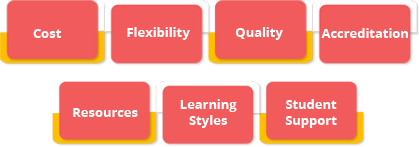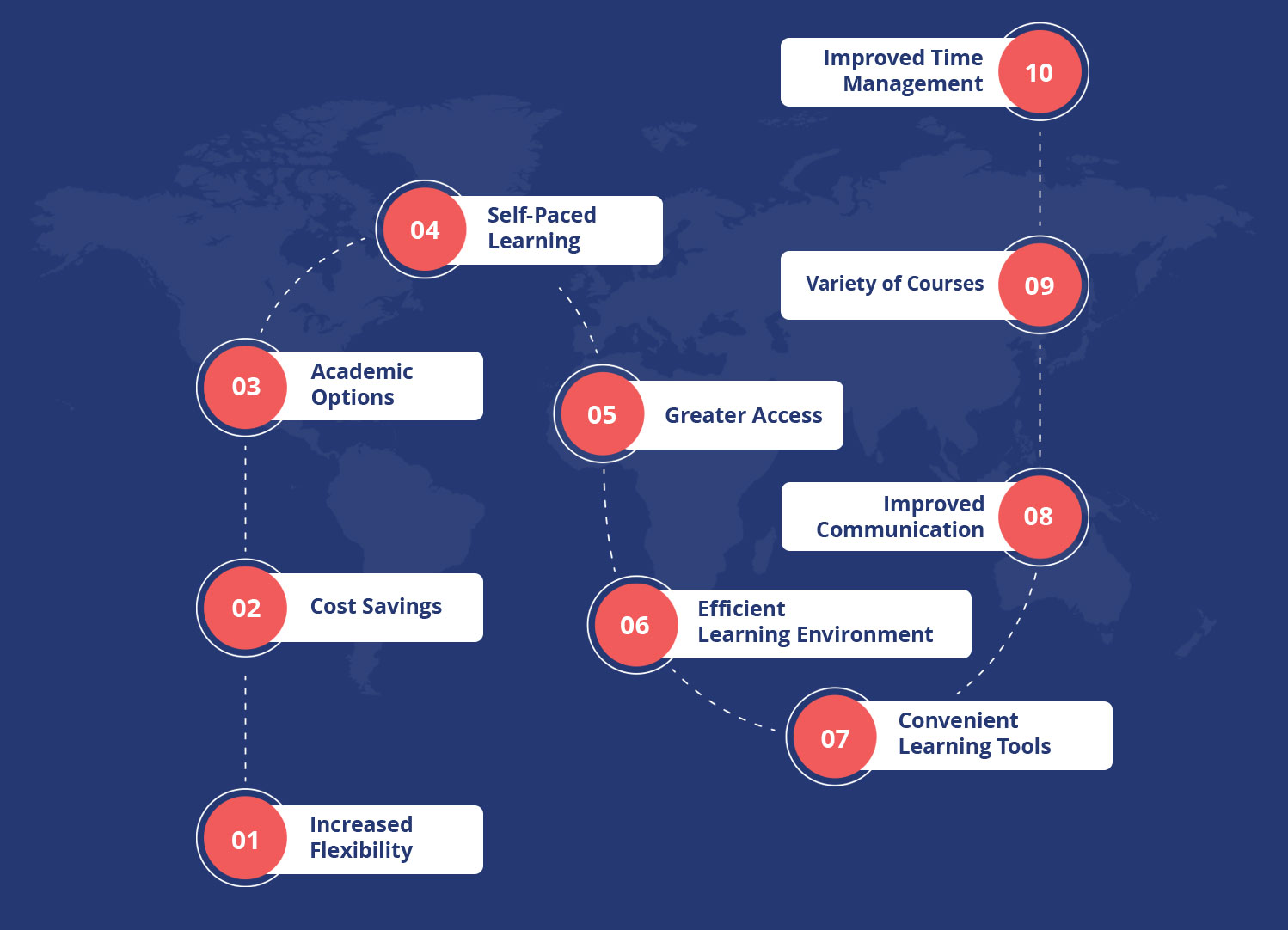
Traditional education has undergone a major transformation over the past few years. Gone are the days when classroom presence was the only way to learn - largely thanks to how technology is changing education. In our modern world, you can access a top-notch education right at your fingertips. All it takes is an internet connection and the power of online learning! Welcome to a new era — the revolution of online education.


Online education, also known as virtual education, is a form of learning that uses digital technology to access educational curricula and instructional resources. This type of learning allows students to take classes from the comfort of their own homes or wherever they have an internet connection. Through online education, students can attend lectures and participate in discussions with instructors and classmates without the need to be physically present in the classroom. Online education is becoming increasingly popular as it offers flexibility and convenience for the students who may not have access to traditional educational settings.

Online education is a learning system that allows students to learn and grow at their own pace. In this type of learning environment, no physical classrooms or teachers are present, and the student can access course material from anywhere with an internet connection.
Online education typically consists of lectures, readings, quizzes, and discussions accessible through the internet. Students can access course material from their computer or mobile device anytime and anywhere. Most online courses also have virtual classrooms where students can collaborate in real time and ask questions to the academic crew or teaching assistant - real education with real-time involvement. Lectures may be recorded and archived, allowing students to listen and re-listen if they need additional clarification. Reading material can be available in PDF or eBook form, making it easy for students to access at their convenience. Quizzes and tests can also be taken online, offering a more interactive learning experience than traditional forms of education.
Finally, discussions are an integral part of many online courses and allow students to engage with one another on essential topics related to the course material. This allows for collaboration and information sharing that further reinforces the learning process. Online education offers flexibility that traditional classrooms cannot match hence providing quality education at your fingertips.
In today's technologically-advanced world, online education is the perfect way to learn. It allows students to learn from the comfort of their homes, at their own pace, and without having to leave home. Plus, online education is affordable. Not only can you save money on tuition, but you will also save time by having access to all the resources that child needs at their fingertips. When the pandemic hit in 2020, it affected education and educational systems worldwide. 1.077 billion students have been affected due to school closures. This led to an enormous disruption in education, but fortunately, online learning has allowed many students to stay on track with their studies. Online learning platforms and apps have enabled students to stay connected and keep learning worldwide. With the rise of technology, online education is becoming more accessible and user-friendly. Many universities now offer courses you can take entirely online or classes in a hybrid or blended format.
Online education is quickly becoming a popular way for people to get their degrees and certificates. Different types of online education are available, depending on the individual's needs and goals.


This form of learning allows the student to participate in chat rooms, virtual lectures, discussion boards and other learning activities without having to log on at a specific time. Asynchronous learning does not take place in real–time.

This form of learning requires students to log on at a specific time in order to participate in virtual lectures and discussions, as well as other course activities. With synchronous learning approaches, learners can join a course from any place around the globe in real-time.

This online education combines asynchronous and synchronous learning elements. It allows students to participate in virtual lectures, discussion boards and other course activities at a specific time or asynchronously
When it comes to choosing online education, there are a lot of important factors to consider. Here are a few things to keep in mind


The cost of online education can vary considerably depending on the school you choose. You'll need to decide how much you're willing to spend. Do you want a more affordable option that's still quality education? Or do you want a more expensive option with cutting-edge technology and more course content?
Look for a program that allows your child to manage school and other commitments.
Check out the reputation and reviews of the school you're considering to ensure its programs meet accepted standards of quality.
Make sure to research the school's accreditation status before making any decisions. This will help to ensure that your education is of high quality and will be recognized by potential employers.
Don't forget to consider your own learning resources - do you have reliable internet access? Are there computer labs available? Does your child feel comfortable using technology for learning? Make sure to consider the preferences and needs of your children before committing to any online educational program.
One of the most important factors is considering what type of learning style your child is most comfortable with. Some students prefer the convenience and flexibility of online courses, while others prefer the personal touch of face-to-face classes
Look for a program that will challenge your child academically and offer diverse learning opportunities. Look for programs that offer a variety of activities and courses to choose from so your child can develop their skills in different areas.
Seeking a quality education from the comfort of your home? It's essential to choose institutions that provide quick access to technical and academic resources; this will ensure any computer troubles are swiftly handled, along with helping plan out course selections for the online learning program
Online education has many benefits, but it's important to make sure you take the time to research and pick the best school for your child.
Although online education is not new, it has gained traction in the past decade. Today, there are more opportunities available for students than ever before. The benefits of pursuing an online education are numerous and diverse. However, many institutions offer both types of programs, and the pros and cons of each must be considered to make the right decision for your child’s future.

For several reasons, online education has become an attractive choice for students and their families. Some advantages of online education are:
Online courses allow students to attend class when and where they choose, rather than being tied to a traditional in-person class schedule. This is particularly beneficial for students who need to fit education into a busy schedule or live far away from an educational institution.
Online courses are typically much cheaper than traditional classroom classes since there are no physical costs like textbooks, materials, or transportation.
The wide range of online classes available means that students can find the right course for their academic goals and interests without being limited by geography or availability at a particular school.
Online classes allow students to work through course materials at their own pace, which can be particularly beneficial for those who need more time than is typically allowed in a traditional classroom setting.
The internet has opened up learning to anyone with access to a computer and an internet connection, making it possible for individuals from all over the world to pursue higher education regardless of geographic location or economic situation.
Students who take online courses don't have to worry about being in a physical classroom and can focus on their studies without the distractions of other students or outside noise.
Learning tools, such as online tutorials and simulations, are often available for students to use at their own pace to reinforce course material and gain a deeper understanding of the subject matter.
Online courses provide students with access to discussion boards and video conferencing to communicate with peers and instructors worldwide. This encourages collaboration and helps build relationships among learners who may never have met in person.
There are many online courses, ranging from technical skills to business management, so individuals can choose the one that best suits their interests and career goals.
Online courses require students to develop good time management skills. With fewer school hours and days to complete the work, students must learn how to prioritise their studies and other commitments. This will help them become better organised and more efficient in the long run.


Today, there are more opportunities available for students than ever before regarding online education. The benefits of pursuing an online education are numerous and diverse. However, on the flip side, online learning has its shortcomings also. Listed below are five disadvantages of online education:
Online education offers many benefits, such as greater flexibility, reduced costs, better time management, etc. But it also possesses a few challenges that must be addressed to ensure successful learning. Below are 5 challenges that must be addressed for online learning to be productive and successful:


Many children don't find online learning as stimulating or motivating as in-person classroom instruction. This can make it hard for them to stay engaged and interested in their studies. According to Statista, "38% of parents said that one of the major challenges of online learning is that their children lack the motivation to pay attention and engage during classes." Online instructors and schools are responsible for breaking out of this dullness or monotony.There is a need to continuously strive to devise creative ways to deliver the online courses and make the class as engaging as possible.


Internet connection is the most important factor in delivering and receiving online classes. Having a premium broadband connection may solve the problem but it isn't a fool-proof one. Even processes like logging in can be quite tedious for students or teachers. To make the process easier and more efficient, a tool is necessary that can complete this task with just one click. An app is also helpful where students and teachers can choose their class or subject and get going.


Learning online can be a lonely experience, especially for younger children. Students might have access to different social interactions than they did in traditional classrooms. Therefore, teachers must create community and team spirit by inspiring collaborative learning. The school should also offer networking opportunities for students like trips, excursions, community projects and other activities that would help them build a strong bond with their peers.


It is quite easy for students to get distracted during an online class. Constant pop-up notifications from videos, blogs, and social media platforms can cause distraction among students and lead them to mindlessly scroll through these platforms. The lack of supervision and accountability can majorly contribute to this problem. Parents or guardians must be present to ensure that the student is focused and attentive during class. You can use social media blockers or simply turn off your notifications during the study period.


Technical issues are the last thing one wants when teaching or learning online. Unfortunately, it is inevitable and can cause disruptions in the learning process.To avoid this, the school should provide 24/7 support to the students and teachers to address the technical disparities

We have discussed and listed the benefits a student can gain from online education, but what about parents? Parents have
several advantages when their children are enrolled in an online learning platform.

Parents can struggle to juggle their children's schoolwork with work commitments. With online education, parents can rest assured that their child will be receiving quality instruction without them having to sacrifice any of their own personal or professional commitments. No more lunch rushes, morning commutes, or after-school activities!

Parents can have greater control over their children's learning by creating schedules and curriculums that best align with the family's needs. Rather than worrying about missing class to attend sporting events or important meetings, parents can now easily adjust the course of instruction to keep up with whatever life throws.

Online education is often cheaper than traditional schooling regarding textbooks, materials, supplies, extracurricular activities, and transportation costs.

Parents don't need to worry about where their children are located regarding online education. All educational materials and lessons can be accessed from any device with an internet connection. This means that a parent's work travel or relocation will no longer interfere with their child's education

Online education allows for a higher level of parental involvement since they can monitor their children's progress more closely. With access to all the lesson plans and assignments, parents can actively participate in their children's learning process and provide additional guidance or assistance when needed.

Online education is a process where students access education via the internet, whereas traditional education allows students to interact face-to-face with teachers and peer groups.
Online education uses interactive learning management systems, such as Blackboard, to provide students with access to course content. Additionally, web conferencing technologies and digital whiteboards allow for real-time communication between teachers and students or multiple students. On the other hand, traditional education relies on textbooks, lectures, and other more traditional teaching methods.
Online education can be accessed from anywhere with internet access, whereas traditional education is limited to the classroom or physical campus of the school.
A personalised approach in online education allows students to learn at their own pace. It is purely student-centric, and the instructor is just a facilitator, providing guidance and answering queries. Traditional education relies more heavily on lectures by instructors and requires students to keep up with the instructor's pace to keep up with their peers.
Online education allows students to access their learning materials anytime, enabling them to complete coursework independently. Additionally, students can access educational materials from anywhere in the world. Traditional education limits learning to specific times and locations and does not allow for as much flexibility in coursework completion.
Attending a traditional institution can often be much higher than the cost of an online course. Additionally, students may not have to pay for textbooks, technology costs, uniforms, and other associated expenses in an online course.
Online education eliminates commuting to a physical campus, thus saving time and resources. Traditional education requires students to spend time travelling back and forth.

Online education has become a popular option for many students looking to further their education. With all of the technology available, it's no wonder more, and more students are turning to this option. But is it better than traditional education? Online learning is not for everyone. If you are happy with the traditional school system and have access to quality education at an affordable price, then you might need something else. However, online education could be the perfect solution for those living in an area with limited resources or no access to good quality traditional education.
Online education offers a great deal of convenience, flexibility and affordability that can't be found in traditional educational systems. You can learn at your own pace and in your preferred environment. Traditional education also has benefits like face-to-face interaction, interpersonal skills, and group learning, vital skills for a student's overall development. So, choosing which one is better comes down to preference. Make sure to consider what resources are available to you and make the best decision for the child's learning needs.

The 21st-century calls for new and innovative forms of learning that can keep up with our fast-paced world. Online learning offers a great way to stay in touch with the latest trends and knowledge in any field. It's convenient, flexible, and cost-effective, making it the perfect learning method. To prepare our children for the future, we must stop relying on traditional ways of teaching and embrace the power of technology. With online learning, we can equip our children with skills and knowledge like problem-solving, computational thinking, collaboration, creativity, and other skills they need to succeed in real life.
Listed below are a few reasons why online learning is the future of education:
It's flexible and accessible: Online learning allows students to access their courses anytime, anywhere. This means they are not restricted by geography or limited to a specific time frame. This allows them to learn at their own pace and from the comfort of their home. This is especially helpful for children who want to follow their passion without compromising their academic performance.
More cost-effective than traditional education: Online learning is much more affordable than traditional classroom learning as it eliminates costs associated with uniforms, travel, and other miscellaneous expenses. Plus, students can access educational material from anywhere without worrying about paying for expensive textbooks.
It allows for a customised learning experience: Online courses have the potential to provide an individualised learning experience to each student. With online tools like artificial intelligence (AI) or machine learning, teachers can track students' performance and customise the lesson plan, assignments and course delivery according to their needs. This helps ensure that each student achieves the maximum learning potential.
It offers a wide selection of programs: Online learning provides students with various courses and programs they can choose from. Whether it's language, history, math or science, online education has something to offer everyone. Plus, with the help of AI, students can find courses and programs tailored to their needs and interests.
Retention Rates Are Higher: Studies have shown that students retain more information when they learn through online education as opposed to traditional methods. Online learning makes the content interactive, which helps students stay focused and engaged in the material.
High-Quality Student-Tutor Interactions: Online learning offers students more opportunities to interact with their teachers. Both students and tutors can use online tools to communicate and collaborate, which helps create a more engaging and meaningful learning experience.

Online education has opened up opportunities for people who want to explore different career options. The ease of learning and flexibility has exposed children to a world of opportunities when it comes to career. Online education offers a wide range of courses and qualifications that can help prepare children for future jobs.
Here's why online education can help children shape their careers:
One of the most significant advantages of pursuing an online education is the flexibility it provides. Students can focus on what they love the most without sacrificing learning time.
Online education encourages students to manage their time and resources more efficiently. This helps them handle multiple tasks and deadlines better, which can be an advantage when entering the job market.
Online education helps to build communication and collaboration skills. Students can learn to interact effectively with their peers and use technology to collaborate on projects.
Online education provides students with global exposure to different cultures, economies, and languages. This is key for those looking to work in international roles or organisations.
Most online degrees come with career guidance and preparation. Subjects like coding and finance are given priority, which can benefit those looking to enter the tech industry or pursue a specific career path. The possibilities are endless with online education.
21K School is Asia's leading school with more than 7500 students from 75+ countries. We have a team of dedicated and qualified teachers worldwide who provide the best learning environment for your children. We are an inclusive and student-centric accredited online school offering students a personalised, transparent, affordable, high-quality education. At 21K school, we aim to foster academic excellence and develop each student's unique potential. Our focus is not just to give a child a conducive environment to excel in studies but also to give enough time and encouragement to explore many possibilities in life and Be More.
We offer the following programmes:

21K School offers the Early Years curriculum for Pre-Primary (Nursery, KG1 and KG2) and follows the National Curriculum Framework of India from Grades 1- 8. It also uses a system based on NIOS for exit-level assessments in Grades 10 and 12, where mark sheets and Pass NIOS, an autonomous body under the Government of India, issue certificates. These certificates are at par with CBSE or CISCE Certificates and valid for entry to colleges and universities, including IIT, Medical Colleges and UPSC.
21K School has partnered with Stride, Inc. USA (formerly K12 Inc.) (NYSE: LRN) - the world's leading online school offering high-quality personalised learning programs for students.The American High School and Dual Diploma are offered through Stride's The Keystone School, an accredited private online school for students worldwide. The Keystone School is accredited by Cognia and the Middle States Association of Colleges and Schools Commissions on Elementary and Secondary Schools.
21K School is affiliated with the Cambridge Assessment International Education (CAIE), U.K., for Primary, Lower Secondary, Secondary and Senior Secondary Programmes. It is authorised to offer IGCSE, 'O' Levels, AS, and A Levels online (Affiliation No. IA702) 21K School is also affiliated and recognised by Pearson Edexcel, the largest awarding organisation in the UK. It is authorised to offer Primary to International Advanced Level Programmes online. (Affiliation number 94883)
21K School is one of the world's first schools to transition into Web 3.0. We are immensely proud to reimagine education with emerging technologies like Blockchain, Metaverse, and NFTs to instil learning, thinking, and creativity in the DNA of our students. Students will soon be able to create and sell their Artwork, Books, podcasts, Music, and Videos on 21K School's NFT Marketplace. They can earn reward points for all activities, timely submission of assignments, assessments and marks scored. Further, we have put our students' identities, accomplishments and mark sheets on a verifiable blockchain.
